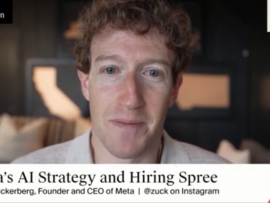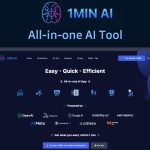
Meta CEO and founder Mark Zuckerberg said Tuesday in an interview that superintelligence will likely become the most significant technology shaping people’s lives.
During his interview on The Information’s TITV with founder and CEO Jessica Lessin, Zuckerberg outlined Meta’s AI strategy, which he said is “to deliver personal superintelligence to everyone in the world.” The company is focusing its superintelligence work on productivity, as well as entertainment, culture, creativity, and relationships. Superintelligence will remain the focus of Meta’s software initiatives.
While the industry debates when superintelligence will be possible, Zuckerberg said, “We should bet and act as if it’s going to be ready in the next two to three years.” He noted that AI models are beginning to demonstrate early signs of self-improvement, bringing the development of superintelligence within reach.
The best form factor for AI
According to Zuckerberg, superintelligence will help individuals track and act on multiple ideas that arise during conversations but are often forgotten. To make this level of assistance accessible, he said that smart glasses will be able to monitor users’ surroundings continuously and provide real-time follow-ups and contextual information.
Zuckerberg stated that if people do not have AI glasses in the future, “you’re basically going to be at a cognitive disadvantage.”
An under-reported strategic advantage for recruiting AI researchers
To achieve this, Meta will need to recruit the best researchers and engineers working on data and infrastructure, backed by a massive amount of compute, which Zuckerberg said the company can support because of its strong business model that throws off a lot of capital.
Lessin asked about reports that Meta is offering pay packages ranging from $100-200 million; Zuckerberg answered that those figures are not accurate by themselves. Acknowledging that the industry is highly competitive, he said that if a company is spending hundreds of billions of dollars on compute and building out multiple gigawatts of clusters, then it really does make sense to do whatever it takes to get the top 50 to 70 researchers.
Having the most compute per researcher is definitely a strategic advantage not only for advancing the work but also for attracting top talent, Zuckerberg said. “I actually think that that has been under-reported as one of the main reasons why people are excited to come do this. The other is just having a clean slate.”
He added that people are excited to work at Meta’s Superintelligence Lab because they have more leverage as researchers.
The limit on capital expenditure spending
In response to a question from Lessin about whether there is a limit to how much he will spend on capital expenditure, Zuckerberg said, “We’ll see how the technology trends … I’m always looking for ways that I can convert capital into a higher quality service for people.’’
He added that Meta is building multiple, multi-gigawatt data centers, all funded by the cash flow of the company.
Is Llama trailing behind other AI models?
When asked whether Meta’s AI model Llama is lagging behind competitors, he deflected. Zuckerberg stated the field is accelerating, adding that he’s not particularly satisfied with current progress and always wants to do better.
If you’re curious about how fierce the battle for AI talent has become, read our coverage of OpenAI CEO Sam Altman’s response to Meta’s aggressive recruiting push.





